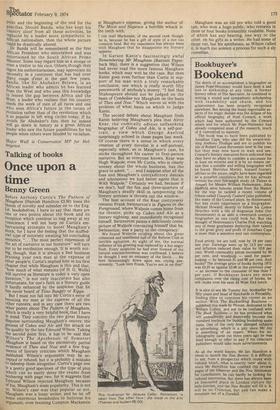Talking of books
Once upon a time
Benny Green
Before Anthony Curtis's The Pattern of Maugham (Hamish Hamilton £3.50) loses the bloom of novelty and subsides on to the Eng. Lit. bookshelves, I have to say that there are one or two points about the book and its reception which continue to nag away at my conscience. I will not harp on Curtis's embarrassing attempts to boost Maugham's stock, for I have the feeling that the stuffedowl type of notoriety awaiting his concluding sentence, "... The most perfect expression of the art of narrative in our literature" will turn out to be retribution enough. It is worth noting, though, that it is always a bad business Praising your own man at the expense of Other people's; Curtis's implied hint in his first Chapter that while Maugham is this and that, "how much of what remains (of H. G. Wells) Will survive as literature is today a very open question," is not only inaccurate but also unfortunate, for one's faith in a literary guide IS hardly enhanced by the suspicion that he has never heard of Tono Bungay or Kipps.
But I must not fall into Mr Curtis's error of boosting my man at the expense of all the Other runners, and in any case there are two Other points about The Pattern of Maugham, Which is really a very helpful book, that I have in mind. They concern the two great literary disputes surrounding Maugham's oeuvre, the genesis of Cakes and Ale and the attack on his quality by the late Edmund Wilson. Taking the second point first, it has to be said that Wilson's The Apotheosis of Somerset Maugham is based on the excessively partial evidence of Then and Now and a few fragnlents of literary criticism which Maugham Published. Wilson's arguments may be accepted or refuted, but it is probably a mistake to sidestep them altogether. Curtis's page one is a pretty good specimen of the type of ploy Which can so easily deter the reader from bothering with page two, for it suggests that Edmund Wilson rejected Maugham because of his, Maugham's mass popularity. This is not SO. Wilson's case was that popular or not, Maugham was a lousy writer, and he let off some enormous broadsides to buttress his argument, even boosting Compton Mackenzie at Maugham's expense, giving the author of The Moon and Sixpence a horrible whack in the teeth with:
I can read Mackenzie, of the second rank though he is, because he has a gift of style of a not too common kind. But my experience has always been with Maugham that he disappoints my literary appetite.
In Garson Kanin's fascinatingly awful Remembering Mr Maugham (Bantam Paperback 50p), there is a suggestion that Wilson had never read the more famous Maugham books, which may well be the case. But then Kanin goes even further than Curtis in support of his man with a truly remarkable conclusion, one which is really worth fifty penceworth of anybody's money, "I feel that Shakespeare should not be judged on the basis of Cymbeline nor Maugham on the basis of Then and Now." Which leaves us with the problem of what basis on which to judge Kanin.
The second debate about Maugham finds Kanin believing Maugham's plea that Alroy Kear, the comically odious selfseeking biographer of Cakes and Ale, is a self-portrait, a view which George Axelrod surprisingly echoed in these pages last week. Of course there is a sense in which every creation of every novelist is a self-portrait, especially when, as in Maugham's case, he sticks throughout his career to first-person narrative. But as everyone knows, Kear was Hugh Walpole; even Mr Curtis, who is clearly uneasy about the whole business, has the grace to admit, "... and I suppose after all the fuss and Maugham's contradictory denials and admissions we had better agree that it WAS Walpole." Certainly we had, because if we don't, half the fun and three-quarters of Maugham's deadly skill in lampooning the literary arriviste is thrown out the window.
The best account of the Kear controversy remains Frank Swinnerton's in Figures in the Foreground, where Walpole comes home from the theatre, picks up Cakes and Ale as a literary nightcap, and immediately recognised himself. Swinnerton paints a deliciously comic picture of Walpole convincing himself that he, Swinnerton, was a party to the conspiracy:
We found Walpole striding about the great columned and tessellated hall of the Reform Club in terrible agitation. At sight of me, the normal radiance of his greeting was replaced by a hot angry flush. Every suspicion he had ever formed of my natural mischieviousness was confirmed. I believe he thought I was an emissary of the Devil.... He bore threateningly down upon me, crying passionately, "Look here Frank. You're not in on this!"
Maugham was an old pro who told a good tale, who won a huge public, who remains in three or four books irresistibly readable. None of which has any bearing, one way or the other, on his gifts as a writer. He had some of those too, but his apotheosis, as Wilson called it, is much too solemn a process for such a sly comedian.


































 Previous page
Previous page